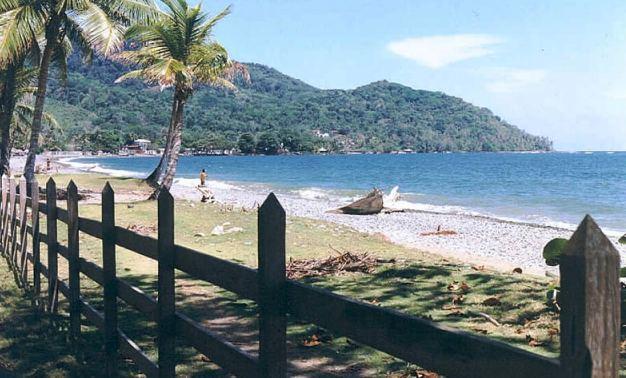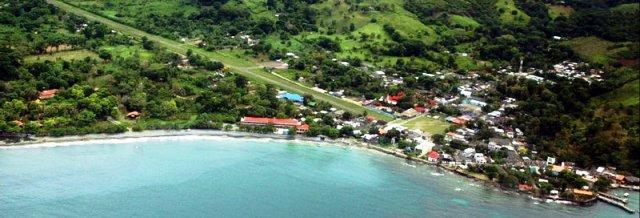Capurganá, Chocó, Colombia
Suggest Place to Visit
1429
Track to location with GPS |
 |
The population of Capurgana is part of the municipality of Acandí, together with Sapzurro they form the last tourist center of Colombia on the Caribbean Sea.
The history of Capurganá dates back to the late nineteenth century, when a separation from Panama had not occurred, intrepid fishermen from Bocachica, Tolú, Puerto Escondido and other towns in the departments of Córdoba and Bolívar jumped into the sea in search of the Carey turtle, whose shell was later sold in Cartagena to be taken to the foreign market.
Upon reaching the western Colombian coast, they found it inhabited by Kuna indigenous people, very poor people dedicated only to hunting and fishing. Normally the trips included staying on land until finding enough Hawksbill turtle to justify the great adventure, that's how they arrived with their women and children and settled in the bay of La Miel, Sapzurro, Capurganá and El Aguacate.
While the process of Carey and Tagua (vegetable ivory) was taking place, the coconut crops that the indigenous people of the region had incipiently began to improve, which with the arrival of white immigration moved towards the coast of San Blas.
In view of the wealth that the area offered in a short time, the towns grew and the Barter trade with Cartagena began, based in Sapzurro. From Cartagena the canoes arrived at Vela loaded with rum, sugar, coffee and soap, all this was exchanged for coconut. This is how large farms such as ´´La Diana´´ and ´´Plan Parejo´´ were developed, but to ´´god coco´´, as they called it at the time, it did not take long to disappear, because the coconut trees were invaded by pests which they called ´´Red Ring´´ and ´´Cucarrón torito´´, which were slowly undermining the palms that were over 30 years old.
In the 60's when a missionary priest and adventurer pilot (Alcides Fernández), arrived in the area looking for a good place to relocate those displaced from the violence in the interior of the country. The father decided to found a town to the west of the mouth of the Atrato River, he named it Balboa. This is how he got to Capurganá and excited the inhabitants of the town (about 300) to build an airstrip. Shortly after, Father Alcider arrived with the tools to carry out the long-awaited work: 6 axes, 6 shovels and 3 pesos.
In a short time they had already covered a stretch 450 meters long by 30 meters wide, where Father Alcides was able to land with his missionary plane. The track did not last long in service, because the wall was dedicated to its main objective, which was to found Balboa and collect those displaced by the violence, while the track was forgotten and the jungle invaded it again.
Between 1975 and 1976, a series of people who had settled in Urabá, linked to the development and banana trade, arrived in Capurganá and found their main establishment center there (especially in the wealth of the sea), later Captain Jorge Mario Uribe arrived, who again motivated the population to reopen the runway and create the Urabá Airline company.
Faced with the beauty of this paradise, Mr. José María Palacio decided to open his farm in Capurganá and soon after he failed… but before the opening of the track, he called his children in Medellín and began with the idea of promoting tourism in the region. Then the Hotel Las Cabañas was born, and from there 20 wooden and straw cabins were built for 2 and 3 people, with communal bathrooms lit with candles and a beautiful stadero - restaurant, with the most delicious food based on prawns, lobsters, snails and a great variety of fish.
With this tenuous tourist promotion, a series of characters characterized by being poets and bohemians arrive in the area, they found paradise with its basic elements: Peace and marijuana. Later, the Hotel Los Longos and Hostería Capurganá were born, but these ended soon and disappeared quickly.
In 1981, when a group of inhabitants of Capurganá decided to form a pro-airport board with the purpose of building a runway for twin-engine airplanes of greater capacity than the simple 5-passenger airplanes that had served until now. This is how new investors begin to join in and what is the current tourist development of Capurganá begins to take shape.
On the shores of the Caribbean Sea and near Cabo Tiburon on the border with Panama, Capurganá offers a marvelous marine and terrestrial landscape, cliffs predominate in the sea, on the shores, beaches of coral material of great whiteness. Capurganá is a border between the jungle and the sea, in the Colombian Caribbean.
Modern hotels, a destination reserved for few tourists, away from the hustle and bustle, without street vendors, but with a striking trade, handicrafts and a lively nightlife; also with an excellent cuisine based on fish and shellfish.
Its name derives from the meaning of "land of the chili pepper", given by its first indigenous inhabitants. This area is also the land of great fishermen who take advantage of the Capurganá River channel to take the best pieces, which you can later enjoy in the restaurants on the beach or the hotel area.
They are its waters and its strategic location makes it a nexus for departure and arrival at different tourist destinations that can be offered. Although many use it as a transit area, once they know and experience the city a little, they fall in love with it and reserve it as a tourist destination.
Capurganá has a good hotel infrastructure and is the starting point for excursions by sea or land to other nearby beaches, to Panama and for ecological walks in Los Icatíos Park.
The main economic source of Capurgana is tourism.
Among the tourist attractions of Capurgana we can mention: the Island of the Birds, the Pool of the Gods, its crystalline waters allow to observe small fish of different colors and aquatic birds in their natural environment, the El Aguacate beach where you can enjoy the seashore of the gastronomic wealth of the region, ecological walk to the Cascada del Cielo, it is also possible to take a walk from this town to Sapzurro, a natural Colombian bay located on the border with Panama, which lasts two hours and from there continue to La Miel, Panama's first town in the Caribbean Sea
Diving and Snorkeling lovers find in Capurgana multiple options to practice it, places where they can enjoy its great variety of still virgin coral reefs and the great diversity of fauna that inhabits them, among which we can mention: Carey turtles , Manta rays, lobsters, crabs, angelfish, parrotfish, puffer, nurse cat sharks
Access: Its access routes are maritime from the town of Turbo or air from Medellín and Cartagena.
Comments
We don´t have yet any comments about:
Capurganá
Capurganá
Be the first to leave a comment as it is very important to inform other people
Outros locais a visitar
Within a radius of 20 km from:Capurganá
Capurganá |
| 14,4 Km |
 |
Hotel reservation near Capurganá within a radius of 20 km
Why to book with ROUTES TOURISTIQUES
The best prices
Our partnerships with the world´s largest operators offer research on the best market prices.
More options
At Rotas Turisticos you can book the hotel, buy the air ticket, book the transfer from the airport to the hotel and vice versa, book the local excursions, rent the car, take travel insurance and consult the places to visit and where to go.
Holiday Tips & Destinations
Hundreds of holiday destinations with all the options that allow you to easily choose the destination that best suits your dream vacation.
ROUTES TOURISTIQUES
Links






